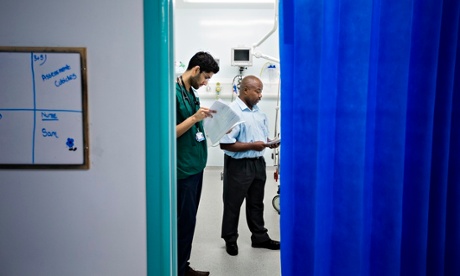
Large socioeconomic and geographical inequality exists in patient use of mental health services, despite Medicare’s aim of providing universal health care.
Using substantial data obtained through freedom of information requests, researchers from Melbourne’s Monash University assessed more than 25m instances of mental health care over the four years to June 2011, undertaking the largest ever national study into mental health services.
The most highly qualified mental health staff – psychiatrists and clinical psychologists – were used up to three times as much by people in wealthier areas compared to those in the most disadvantaged ones, they found.
However, use of less qualified mental health staff, like general practitioners, general psychologists and social workers, was more equitable across the country.
With research consistently showing higher rates of severe mental illness in the most disadvantaged areas, it was concerning that people living in those areas were accessing specialist services less, the authors of the research published in the Medical Journal of Australia on Monday said.
Lead author of the study, Professor Graham Meadows, said the data provided “an extraordinary opportunity” to comprehensively assess delivery of mental health services through Medicare.
A key reason why psychiatry and clinical psychology services were being used less in some areas was because those practitioners simply weren’t practicing there, he said.
“In areas where we expect higher rates of mental disorder we are seeing lower rates of specialist services use, which really challenges the idea of equity,” he said.
“This is not an equitable or universal way of delivering services, with those in advantaged areas get a different package of services, leaning more heavily towards the more expensive ones.”
Access to the Medicare data to perform the analysis was hard-won. Associate professor Roger Gurr, from the University of Western Sydney, requested the information for individuals postcode in Australia multiple times from the government, but was refused.
“When you aggregate data and only make it available by state for example, you can hide many problems,” he said.
Gurr enlisted the help of lawyers from the not-for-profit Public Interest Advocacy Centre, and his freedom of information request was eventually successful, obtaining mental health service use data for 98.6% of postcodes.
Gurr, who has worked in mental healthcare in Blacktown, NSW, since 1980, said the information confirmed what he was seeing professionally.
That health was managed by both the federal and state and territory governments complicated the system, he said.
“It leads to a situation where mental health programs are funded like measles – a spot here and a spot there,” he said.
Higher paid, more qualified professionals needed to be given incentives to practice in areas away from major cities, an author of the paper, Dr Joanne Enticott, said.
“Perhaps they could be encouraged to practice one day a week in in disadvantaged areas and could be paid more for doing so,” she said.
“Because their caseloads are high in city areas, it could be they are just unaware of just how great the demand for their services is in other areas, and I hope findings like those in our study will encourage them to think about how to service these areas better.”
In 2006, the government introduced an initiative called “Better Access” where new mental health services were added to Medicare to improve patient access to psychiatrists, psychologists, and general practitioners.
A leading psychiatrist and the director of Orygen Youth Health, Professor Patrick McGorry, said the results, which found Better Access had not led to equal access to services, did not mean the initiative had failed, or that specialist mental health workers should be reallocated from wealthier areas to more rural or disadvantaged ones.
Redistributing government funding from wealthier areas would be a mistake, he said.
“People in affluent areas get a better deal, but they still don’t have a perfect deal when it comes to mental health,” McGorry said.
“There is unmet need everywhere. The most radical thing would be to provide higher rebates to providers working in disadvantaged and rural areas, or restricting new provider numbers to such regions to redistribute the workforces. This should probably be done across the board in health, but it is especially important in mental health.”
